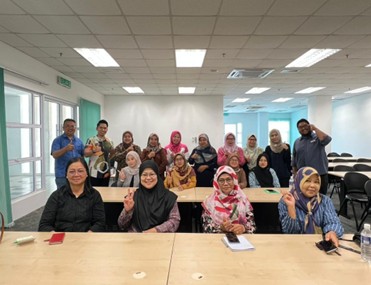
Universiti Malaysia Sarawak (UNIMAS), in collaboration with the Kementerian Ekonomi, Sarawak Economic Development Corporation (SEDC), Sarawak Digital Economy Corporation (SDEC), and the Sarawak Craft Council, successfully conducted a two-day engagement and training programme under the research project titled “Transformation of Rural Economy into Digital Economy for Sustainable Business Performance: A Baseline Study of Handicraft Industry in Rural Areas of Sarawak.”
Held on 1–2 November 2025 in Samarahan, the programme brought together artisans and craftsmen from Kota Samarahan and Asajaya—particularly songket weavers and handicraft producers—as part of a broader initiative to strengthen Sarawak’s rural creative economy through digital marketing and artificial intelligence (AI) adoption. Kota Samarahan marked the first stop in this statewide initiative under the Short-Term Research Grant (Kementerian Ekonomi), with upcoming sessions planned in Sri Aman, Mukah, Sibu, Miri, and Limbang to engage artisans and craft entrepreneurs across Sarawak.

Led by Dr. Asmaul Husna Haris Fadzilah from the Faculty of Economics and Business, UNIMAS, the project aims to develop a digital economic framework tailored to the needs of Sarawak’s handicraft entrepreneurs. The study explores how digital marketing platforms and AI innovations can sustain business performance, improve market visibility, and enhance competitiveness—while preserving the region’s rich cultural heritage and traditional craftsmanship.
Throughout the two-day programme, participants engaged in interactive sessions facilitated by SEDC, SDEC, and UNIMAS. The first day focused on Digital and Social Media Marketing, introducing artisans to platforms such as TikTok Shop, Facebook Marketplace, WhatsApp for Business, and Shopee. These tools were presented as accessible avenues for promoting and selling handmade products in the digital space. The day concluded with a session titled “AI for Business,” which demonstrated how generative AI tools like ChatGPT and image-based platforms can support content creation, visual storytelling, and branding for craft-based enterprises.
On the second day, SEDC and SDEC led practical workshops on entrepreneurship development, digital inclusion, and market access strategies. These sessions aligned with Sarawak’s Post-COVID Development Strategy (PCDS) 2030 and the Ekonomi MADANI framework. UNIMAS concluded the programme with hands-on demonstrations on integrating AI-assisted applications to support branding and long-term business sustainability.

This initiative forms a key community engagement component of the UNIMAS-led Short-Term Research Grant project titled “Project on the Transformation of the Rural Economy into a Digital Economy for Sustainable Business Performance: A Baseline Study of the Handicraft Industry in Rural Areas of Sarawak.” According to Dr. Asmaul Husna, “This project aims not only to gather baseline data but also to create direct impact by equipping local artisans with digital knowledge and practical tools. Empowering them with AI and digital marketing skills ensures the continuity and sustainability of Sarawak’s craft heritage in today’s digital economy.”
The project team comprises Prof. Dr. Dayang Affizzah Awang Marikan, Assoc. Prof. Dr. Helen Tan Sui Hong, Prof. Dr. Johari Abdullah, Dr. Nur Auni Ugong, Dr. Nor Afiza Abu Bakar, and Mr. Haslan Ottot. Together, they are committed to bridging economic development, technological innovation, and cultural preservation for Sarawak’s creative industries.
The outcomes of this programme will contribute to the study’s data collection and engagement phase, supporting the development of a Manual Guide for Policy Development. This guide will assist agencies such as SDEC, SEDC, and the Sarawak Craft Council in formulating inclusive digital strategies for artisans across the state.
By fostering collaboration among academia, industry, and government, this initiative represents a significant step toward realizing Sarawak’s vision of a resilient, digitally empowered, and culturally sustainable rural economy.




